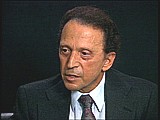You searched for: 成都谷歌优化价格【TG飞机:@bapingseo】基本不等式推廣【TG电报:@bapingseo】微盘交易所源码系统【Telegram:@bapingseo】ag街机网站pg麻将胡了?Fo62q1/473135.html
<< Previous | Displaying results 341-350 of 393 for "成都谷歌优化价格【TG飞机:@bapingseo】基本不等式推廣【TG电报:@bapingseo】微盘交易所源码系统【Telegram:@bapingseo】ag街机网站pg麻将胡了?Fo62q1/473135.html" | Next >>
-
David (Dudi) Bergman describes being rescued by inmates before he could be taken to the Dachau crematorium
Oral HistoryThe Germans occupied David's town, previously annexed by Hungary, in 1944. David was deported to Auschwitz and, with his father, transported to Plaszow. David was sent to the Gross-Rosen camp and to Reichenbach. He was then among three of 150 in a cattle car who survived transportation to Dachau. He was liberated after a death march from Innsbruck toward the front line of combat between US and German troops.
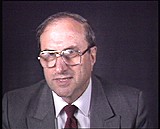
-
Colonel Richard R. Seibel describes food distribution after liberation of the Mauthausen camp
Oral HistoryIn June 1941, Richard was ordered to active duty in the US Army. After a period of training, he was sent to Europe. He entered Austria in April 1945. A patrol came upon the Mauthausen camp and Richard was appointed to take command of the camp. He organized those inmates who had survived in the camp until liberation in May 1945, and brought in two field hospitals. After 35 days in Mauthausen, he was transferred to a post in the Austrian Alps.
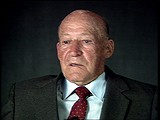
-
Walter Meyer describes his 1943 trial for looting, and the impact of his role in the Edelweiss Pirates on the sentence he received
Oral HistoryWalter was born in Kassel, north central Germany, but grew up in the Rhineland. As a youth, Walter questioned the German superiority and antisemitism he was taught. His father, an anti-Nazi, refused to allow Walter to enter one of the Adolf Hitler Schools, but did permit him to join the Hitler Youth. However, Walter's rebellious streak led him to hide a Jewish friend in his basement. He also formed a gang that played pranks on young Nazis and helped French prisoners of war. They called themselves Edelweiss…
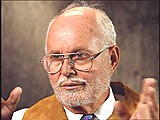
-
Sandor (Shony) Alex Braun describes playing the violin for SS guards in Dachau. after two prisoners before him had been killed
Oral HistoryShony was born to religious Jewish parents in a small Transylvanian city. He began to learn the violin at age 5. His town was occupied by Hungary in 1940 and by Germany in 1944. In May 1944, he was deported to the Auschwitz camp in Poland. He was transferred to the Natzweiler camp system in France and then to Dachau, where he was liberated by US troops in April 1945. In 1950, he immigrated to the United States, and became a composer and a professional violinist.
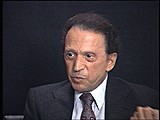
-
William (Bill) Lowenberg describes Zionist and cultural activities in the Westerbork camp
Oral HistoryAs a boy, Bill attended school in Burgsteinfurt, a German town near the Dutch border. After the Nazis came to power in Germany in January 1933, Bill experienced increasing antisemitism and was once attacked on his way to Hebrew school by a boy who threw a knife at him. In 1936, he and his family left Germany for the Netherlands, where they had relatives and thought they would be safe. However, after Germany invaded the Netherlands in May 1940, antisemitic legislation--including the order to wear the Jewish…
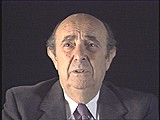
-
Thomas Buergenthal describes the charges brought at the International Military Tribunal at Nuremberg
Oral HistoryJudge Thomas Buergenthal was one of the youngest survivors of the Auschwitz and Sachsenhausen concentration camps. He immigrated to the United States at the age of 17. Judge Buergenthal devoted his life to international and human rights law. He served as chairman of the United States Holocaust Memorial Museum’s Committee on Conscience; was named the Lobingier Professor of Comparative Law and Jurisprudence at the George Washington University Law School; and served for a decade as the American judge at…
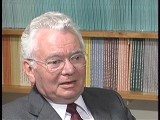
-
Thomas Buergenthal describes differing perspectives on international justice
Oral HistoryJudge Thomas Buergenthal was one of the youngest survivors of the Auschwitz and Sachsenhausen concentration camps. He immigrated to the United States at the age of 17. Judge Buergenthal devoted his life to international and human rights law. He served as chairman of the United States Holocaust Memorial Museum’s Committee on Conscience; was named the Lobingier Professor of Comparative Law and Jurisprudence at the George Washington University Law School; and served for a decade as the American judge at…
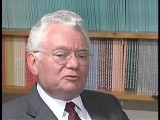
-
Thomas Buergenthal describes the plight of refugees today
Oral HistoryJudge Thomas Buergenthal was one of the youngest survivors of the Auschwitz and Sachsenhausen concentration camps. He immigrated to the United States at the age of 17. Judge Buergenthal devoted his life to international and human rights law. He served as chairman of the United States Holocaust Memorial Museum’s Committee on Conscience; was named the Lobingier Professor of Comparative Law and Jurisprudence at the George Washington University Law School; and served for a decade as the American judge at…
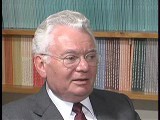
-
Thomas Buergenthal discusses whether it is ever too late to seek justice
Oral HistoryJudge Thomas Buergenthal was one of the youngest survivors of the Auschwitz and Sachsenhausen concentration camps. He immigrated to the United States at the age of 17. Judge Buergenthal devoted his life to international and human rights law. He served as chairman of the United States Holocaust Memorial Museum’s Committee on Conscience; was named the Lobingier Professor of Comparative Law and Jurisprudence at the George Washington University Law School; and served for a decade as the American judge at…
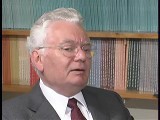
-
Sandor (Shony) Alex Braun describes the death of his father in Kochendorf, a subcamp of Natzweiler
Oral HistoryShony was born to religious Jewish parents in a small Transylvanian city. He began to learn the violin at age 5. His town was occupied by Hungary in 1940 and by Germany in 1944. In May 1944, he was deported to the Auschwitz camp in Poland. He was transferred to the Natzweiler camp system in France and then to Dachau, where he was liberated by US troops in April 1945. In 1950, he immigrated to the United States, and became a composer and a professional violinist.
